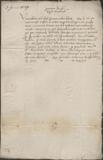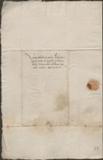Letter #6682
Ioannes DANTISCUS to Ermland (Warmia) ChapterHeilsberg (Lidzbark Warmiński), 1539-06-03
English register:
Dantiscus reports that he has acceded to the canons’ request regarding the liberated peasant, but he is surprised that they are turning so many peasants into merchants. He is afraid the administrators of Mehlsack (Melzak) employ such people for trade, which is a disgrace for the clergy and the Church. He orders that the Chapter spare no effort to prevent these inappropriate actions, especially in view of the information that Alexander Sculteti recently dispatched several carts loaded with flax from his home.
Manuscript sources:
Prints:
| ||||||||
Text & apparatus & commentaryPlain textText & commentaryText & apparatus
 RA, Extranea, Polen, Bihang Ermland, vol. 148, Kapitelarkivet i Ermland, f. 5v
RA, Extranea, Polen, Bihang Ermland, vol. 148, Kapitelarkivet i Ermland, f. 5v
Venerabilibus Dominis
 RA, Extranea, Polen, Bihang Ermland, vol. 148, Kapitelarkivet i Ermland, f. 4r
RA, Extranea, Polen, Bihang Ermland, vol. 148, Kapitelarkivet i Ermland, f. 4r
Venerabiles Domini, fratres sincere nobis dilecti.
Quae Fraternitates Vestrae pro manumisso
Quae feliciter valeant.

